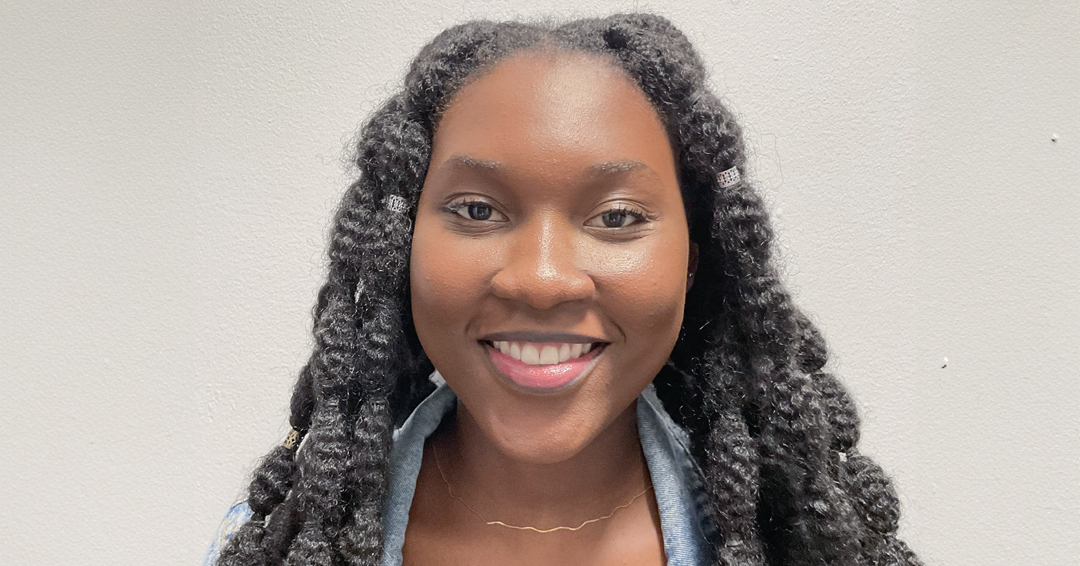
This Q&A series is part of Black History Month and Beyond, an initiative of the BHM Organizing Committee co-led by Black students and faculty from the Faculty of Medicine and Health Sciences with the Equity, Diversity, and Inclusion Anti-Racism Committee (EDI-AR) of the School of Population and Global Health.
Can you tell us a bit about yourself?
I am a first-year MSc Public Health student at McGill in the Department of Epidemiology, Biostatistics, and Occupational Health. I am originally from Burkina Faso and Togo, and I have been in Canada for 10 years now. I enjoy discovering Montreal’s parks, doing activities with friends during the summer, spending time with my family and learning new hairstyle techniques. Due to my caring nature and my love for taking care of elderly people, I would like to become a geriatrician with training in public health to contribute to the current work being done in Canada to offer our elders a higher quality of care.
Can you describe your program of study and your research project?
My program is course based and I chose global health as my specialization stream to learn how to work with different communities to restore and/or improve health. For my practicum this summer, I will work with a non-governmental organization established to train and equip psychology graduates to contribute to the expansion of mental health services across Ghana. My project will focus on assessing the impact of a specific training on the mental health knowledge and professional wellbeing of trainees.
What inspired you to pursue your area of research? What do you hope to achieve?
Growing up in Burkina Faso, I have observed injustice in the medical system and lack of organization that lead to serious health issues and cost others their lives. Witnessing family members get ill or die for reasons that could have been avoided made me realize that I wanted to contribute to offering greater care wherever I will live. In the future, I hope to do research on improving care for elders in minority communities in Canada.
Why did you choose McGill?
I completed my undergraduate studies at McGill in physiology, and during those three years I fell in love with the campus and found a community in which I felt supported, challenged to grow and loved. The beautiful campus and my community were factors that influenced my decision, but mostly, I wanted to stay at McGill because it is one of the best universities in Canada, it is not too far from Quebec City where my family lives, and it is located in a vibrant city that I want to explore more.
Can you describe your community involvement and why you feel it is important, especially as a member of the Black community?
Throughout my undergraduate studies, I was involved in the McGill African Student Society (MASS). During my second year I was the Vice-President of Advocacy and this year I am the Co-President of MASS. It was through MASS that I discovered the community to which I alluded earlier. My first year after the pandemic was not easy to navigate. However, I felt very blessed to have met other students in the Black community who contributed to making this transition to campus and university life during a pandemic much easier. Our desire to create a home away from home, to support each other, and to inspire future Black students brought us together. As a member of MASS, I learned to step out of my comfort zone, and I improved my leadership, event planning and time management skills. I also developed collaboration skills when we worked with other Black student associations like the Black Student Network or the
National Society of Black Engineers chapter at McGill. I believe my involvement in the Black community is important for my contribution to building and maintaining a space where future Black students can feel at home when they arrive at McGill University.
How has your identity as a member of the Black community informed your research interests or community involvement?
As a researcher in the Black community, I have developed the desire to learn from and work with other minority groups to improve the quality of healthcare they have access to in Canada. During my undergraduate studies, I worked in two biology laboratories, and I was always struck by how scarce Black students and professors were in my research building. This is also the case in my master’s program. Consequently, I value my involvement in the Black community at McGill because I believe that it is important for me, who has the privilege to be a Black researcher, to help and inspire Black undergraduates and CEGEP students who want to do research but do not feel represented in the field.
What advice would you give your younger self, knowing what you know today?
If I could go back in time and speak to my younger self, I would give her the following advice:
– Do not be afraid to step out of your comfort zone and try new things
– It is okay to ask questions and ask for help when needed
– Do not dwell on your mistakes, but learn from them
– Dream big and do not let circumstances or people make you believe that you are not enough.
Related:
BIPOC Change Champions: In conversation with Milca Meconnen, master’s student in public health
